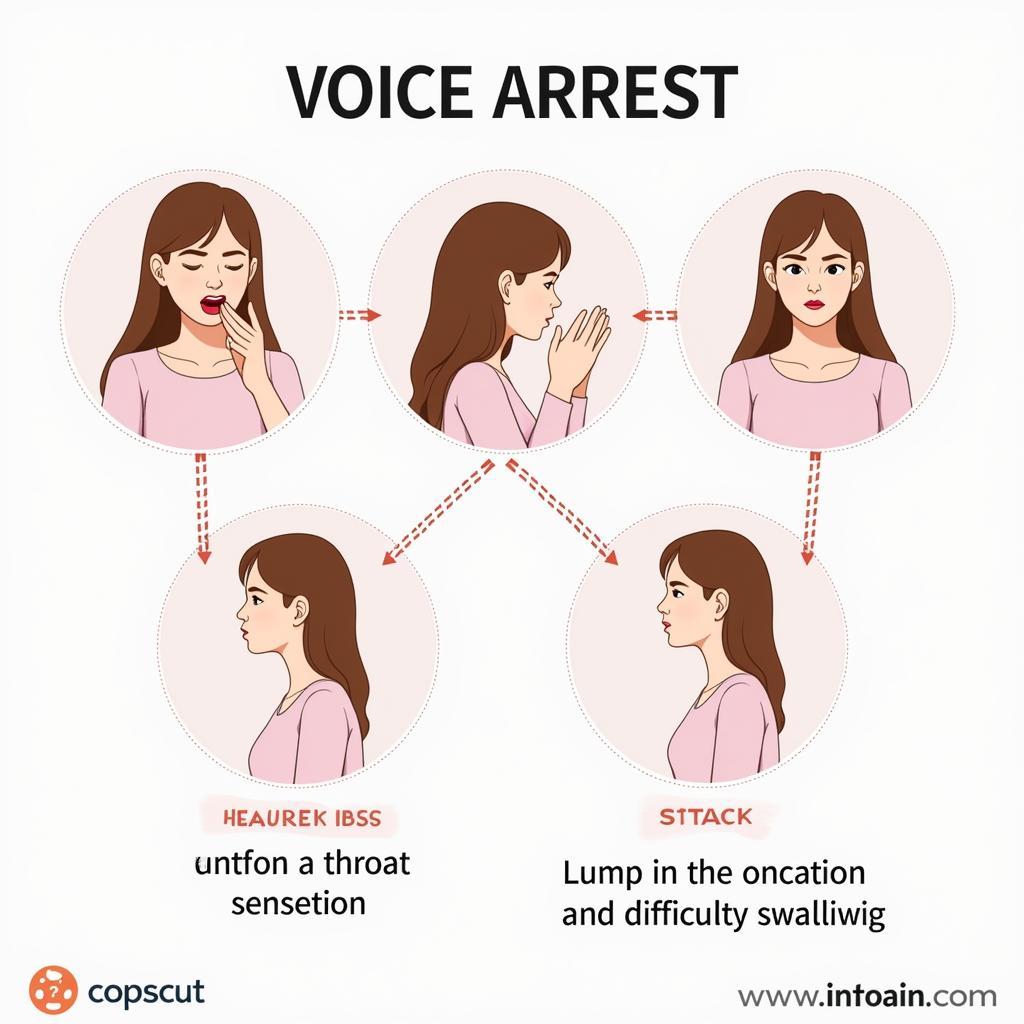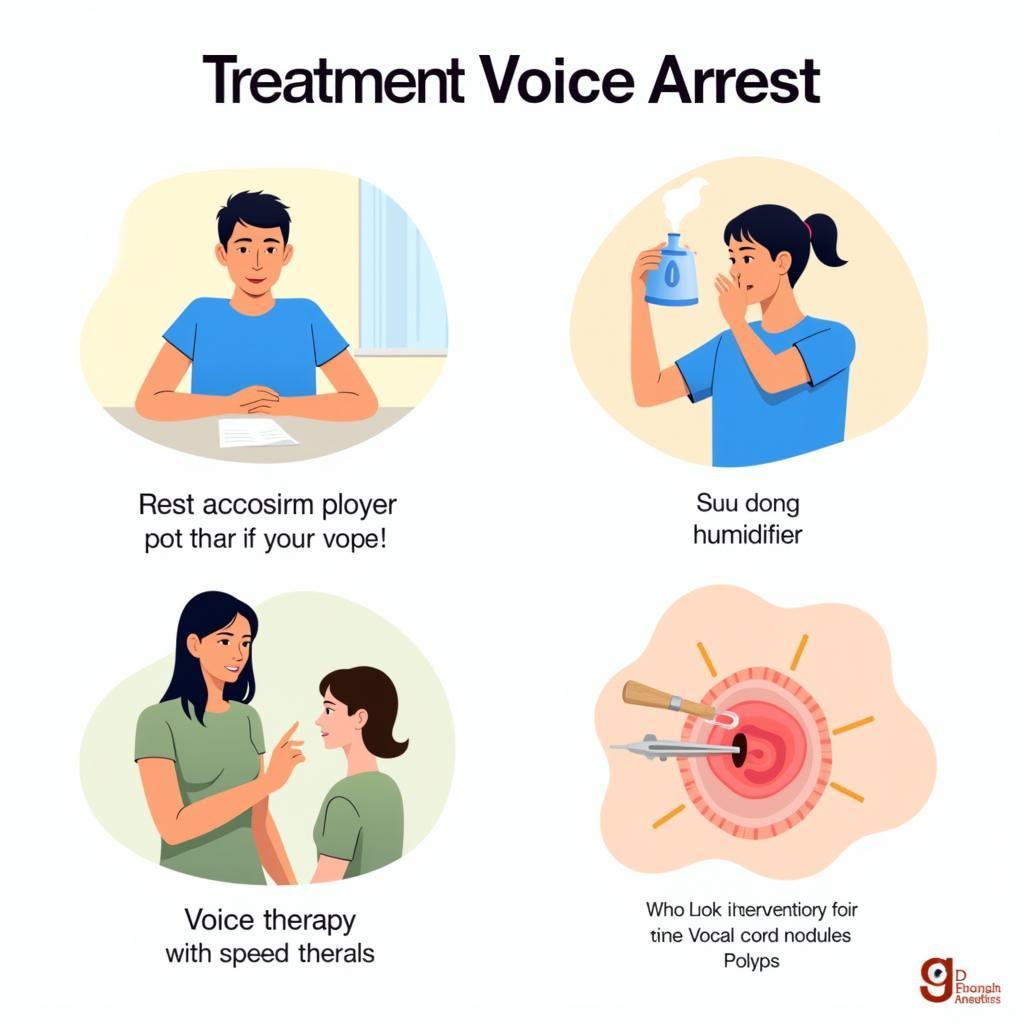Voice Arrest, the sudden inability to speak, can be a jarring and concerning experience. It can range from a brief whisper to complete silence, often leaving individuals feeling frustrated and anxious. This guide will delve into the causes, symptoms, diagnosis, and management of voice arrest, empowering you to better understand and address this vocal challenge.
What Causes Voice Arrest?
Voice arrest occurs when the vocal cords, responsible for producing sound, are unable to vibrate properly. Several factors can contribute to this dysfunction, including:
- Laryngitis: Inflammation of the larynx, often caused by viral infections or overuse, can lead to swelling and stiffness of the vocal cords, hindering their vibration.
- Vocal cord nodules or polyps: These benign growths can interfere with vocal cord closure and vibration, resulting in voice changes, including voice arrest.
- Muscle tension dysphonia: This condition involves excessive tension in the muscles surrounding the larynx, impacting vocal cord movement and potentially causing voice arrest.
- Neurological conditions: Certain neurological disorders, such as Parkinson’s disease or multiple sclerosis, can affect the nerves controlling the vocal cords, leading to voice difficulties.
- Psychological factors: Stress, anxiety, and emotional trauma can sometimes manifest as voice arrest, even in the absence of physical issues with the vocal cords.
Recognizing the Symptoms of Voice Arrest
The primary symptom of voice arrest is the inability to speak or a significantly reduced speaking volume. This may be accompanied by other symptoms such as:
- Hoarseness or a raspy voice
- Throat pain or discomfort
- Difficulty swallowing
- A sensation of a lump in the throat
 Triệu chứng mất tiếng (Voice Arrest)
Triệu chứng mất tiếng (Voice Arrest)
How is Voice Arrest Diagnosed?
If you experience voice arrest, it’s crucial to consult a doctor or a speech-language pathologist. They will typically perform a physical examination of your throat and larynx, potentially using a laryngoscope to visualize the vocal cords. Further diagnostic tests, such as acoustic analysis or electromyography, might be recommended to evaluate vocal cord function.
Managing and Treating Voice Arrest
Treatment for voice arrest depends on the underlying cause. For laryngitis caused by a viral infection, rest and voice rest are often the primary recommendations. In cases of vocal cord nodules or polyps, voice therapy or surgery might be necessary. Muscle tension dysphonia often benefits from voice therapy and stress management techniques.
What to Do When You Experience Voice Arrest?
- Rest your voice as much as possible.
- Avoid whispering, as it can strain the vocal cords further.
- Stay hydrated by drinking plenty of water.
- Use a humidifier to add moisture to the air.
 Điều trị voice arrest
Điều trị voice arrest
Conclusion
Voice arrest can be a disruptive experience, but with proper diagnosis and management, most individuals can regain their voice. Understanding the causes, symptoms, and treatment options empowers you to take proactive steps towards vocal health. If you experience persistent voice changes or voice arrest, seek professional guidance to address the underlying issue and restore your voice. Remember, when it comes to vocal health, early intervention is key.
FAQ about Voice Arrest
- Can voice arrest be permanent? While rare, voice arrest can become chronic in certain cases, especially if the underlying cause is not addressed promptly.
- Is voice arrest always a sign of a serious medical condition? Not always. Often, voice arrest is a temporary symptom of laryngitis or vocal strain.
- How long does it usually take for voice arrest to resolve? The duration of voice arrest varies depending on the cause. Viral laryngitis typically resolves within a few weeks.
- What can I do to prevent voice arrest? Avoiding vocal strain, staying hydrated, and managing stress can help prevent voice arrest.
- Can voice therapy help with voice arrest? Yes, voice therapy can be beneficial in treating voice arrest caused by muscle tension dysphonia or vocal cord nodules.
- When should I see a doctor for voice arrest? Consult a doctor if your voice arrest lasts longer than two weeks or is accompanied by other symptoms, such as difficulty swallowing or pain.
- Are there any home remedies for voice arrest? Resting your voice, gargling with warm salt water, and inhaling steam can provide some relief from voice arrest symptoms.
Situations where voice arrest is frequently questioned
- After a concert or sporting event where you’ve been cheering loudly.
- Following a prolonged period of speaking or singing.
- During a bout of the common cold or flu.
- When experiencing significant stress or anxiety.
Suggested further reading:
- Other articles about vocal health on our website.
- Information about specific voice disorders.
Khi cần hỗ trợ hãy liên hệ Số Điện Thoại: 0909802228, Email: doibongda@gmail.com Hoặc đến địa chỉ: 101 Đ. Lý Chiêu Hoàng, Phường 10, Quận 6, Hồ Chí Minh, Việt Nam. Chúng tôi có đội ngũ chăm sóc khách hàng 24/7.